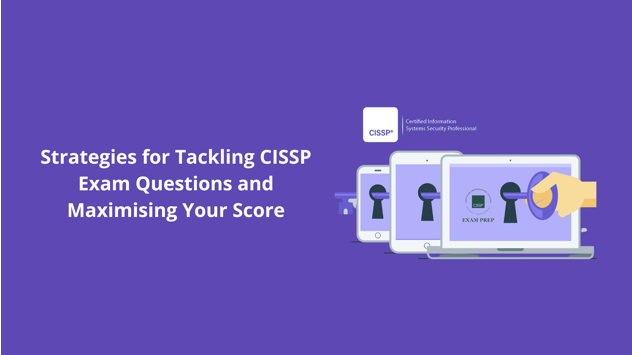The Certified Information Systems Security Professional (CISSP) exam is a demanding exam that gauges candidates’ level of information security knowledge. A strong understanding of security topics is necessary for passing the CISSP test, but it’s also essential to have efficient tactics for handling the exam’s vast range of questions. Although CISSP Training provides candidates with basic information, success depends on a planned approach. In this blog, we’ll explore strategies for dealing with CISSP test problems that will increase your likelihood of getting a high grade. Also, we discuss the advantages of using CISSP Practice Exam for training.
Table of contents
- Understanding the CISSP Exam
- Strategies for Success
- Utilising CISSP Practice Exams
- Conclusion
Understanding the CISSP Exam
Before attempting to tackle the CISSP exam, it’s essential to understand its structure well. The exam covers a range of security domains, such as security and identity and access management, security assessment and testing engineering, communication and network safety, risk management, asset security, security architecture and security operations, and software development security. With 250 multiple-choice and advanced innovative questions, the CISSP test evaluates your analytical and decision-making skills and knowledge in these areas.
Strategies for Success
Let’s explore Strategies for tackling CISSP exam questions and maximising your score:
- Effective time management is essential, given the limited time available. Give each question a specific time, and don’t stray from it. If you encounter a difficult question, try not to think about it too much. Move on and, if time allows, come back to it later.
- Please read each question very carefully to understand its subtleties. Look out for terms like “not,” “expect,” or “most likely.” It’s possible to get the wrong responses by misinterpreting these terms.
- Use the method of elimination if you need more confidence about the response. You’ll have a better chance of choosing the correct answer if you cross out any blatantly wrong answers.
- Although each discipline is crucial, you could be more knowledgeable in some than others. Recognise your abilities and devote more attention to your areas of expertise.
- Move on and mark the response for review if you need clarification. Once the exam has been taken once, flagged questions can be reviewed again.
- Start by answering somewhat more straightforward questions. This increases your confidence and frees up time for the latter, more complex questions.
Utilising CISSP Practice Exams
Practise tests for the CISSP are an essential part of your preparation arsenal. Here’s why they’re important:
- You can get used to the format and time constraints by taking practice examinations that simulate the exam atmosphere.
- Exam practice reveals your areas of strength and weakness across various topics. You can concentrate your study efforts where they are most required using the information provided
- You are exposed to various question types and ideas in CISSP practice examinations. This equips you to answer any question that may come up on the test.
- You may perfect your time management techniques and modify your speed for various questions by taking practice examinations.
- Your confidence will increase, and your worry will decrease on the day of the exam if you perform well on practice examinations.
Read Also: Top 8 China Manufacturers
Conclusion
To pass the CISSP test, a critical milestone, information security professionals must have a combination of knowledge, analytical skills, and practical strategies. Participating in comprehensive CISSP training may give you the necessary knowledge and boost your exam performance with the right approach. Test practice is crucial to this process because it prepares you to identify your strengths and weaknesses and builds confidence. Exam practice also simulates the actual test environment. You increase your chances of passing the CISSP exam and getting a mark that appropriately reflects your comprehension of information security principles by utilising these strategies and including practice exams in your study strategy.




